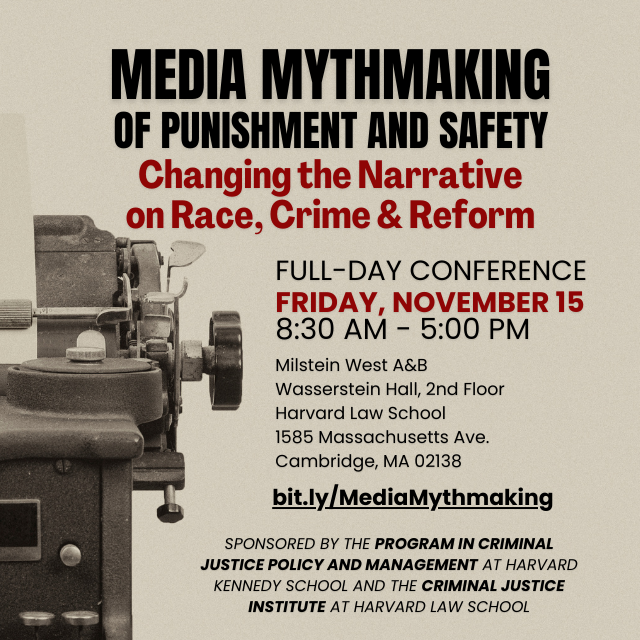Media Mythmaking of Punishment and Safety: Changing the Narrative on Race, Crime, and Reform
November 15, 2024
All day
This event has passed
Milstein West
1585 Massachusetts Ave
Cambridge, MA 02138

Join the Program in Criminal Justice Policy and Management at Harvard Kennedy School and the Criminal Justice Institute at Harvard Law School for a one-day convening to explore media coverage of crime and of criminal legal reform—the dual dangers of lies and disinformation as well as strong truths weakly told or weakly understood. Together we will examine different paths forward where communities are explored in their full complexity and able to shape their own public narrative about accountability in the face of harm—individual, institutional, and systemic. This conference will explore the barriers to, and paths toward, achieving a vision where media do not reproduce common myths of public safety and do not rely on dehumanizing depictions to legitimate public policies of inequity. We will also address how communities can hold media accountable when negative portrayals continue and can build their own media infrastructure to tell their own stories.
Find the full agenda and updated list of speakers at bit.ly/MediaMythmaking.
Panel 1: Is Crime News?
This panel will explore how reporting can distort or unearth what happens in our system of criminal punishment, how communities experience crime reporting, and bigger questions about how media create or entrench narratives about who deserves protection and what produces safety.
Panel 2: Elite Media Capture: How Position and Power Shape Race and Crime Narratives
This panel will explore who gets treated as valid sources of knowledge when it comes to coverage of crime, harm, the criminal legal system, and social movements for reform.
Panel 3: Reform and Retrenchment: Media, Fear, and Policy Rollbacks that Impede Safety
Too often, fear-based narratives obscure or ignore evidence, grow out of racism and feed racial stereotypes, and shift public opinion through distortion or obfuscation. How can journalists partner with communities in pushing back against these dominant narratives and preventing rollbacks and retrenchment?
KEYNOTE
Yohance Lacour, Invisible Institute | Pulitzer Prize Winner for You Didn’t See Nothin
Panel 4: When Media Create the Story – Who Gets to be a Victim, and Who is Marked a Criminal?
This panel will explore how shifting media coverage can bring much-needed attention to the human dignity of people who are too-often ignored, and how that broader shift can also combat stereotypes about who deserves protection, fueling a more holistic public policy to honor what people who have survived harm need.
Panel 5: Telling Our Own Stories: Media Accountability and Elevating Ignored Voices
Panelists will explore how the information ecosystem can foster better policy debates on safety and healing shifted toward how and where to invest resources to address the root causes of crime and what actually creates safety. How can news coverage drive us toward public policy that instills meaningful accountability and opportunities for changed behavior for people who have caused harm, and fosters community safety by providing material support to people who have been harmed?